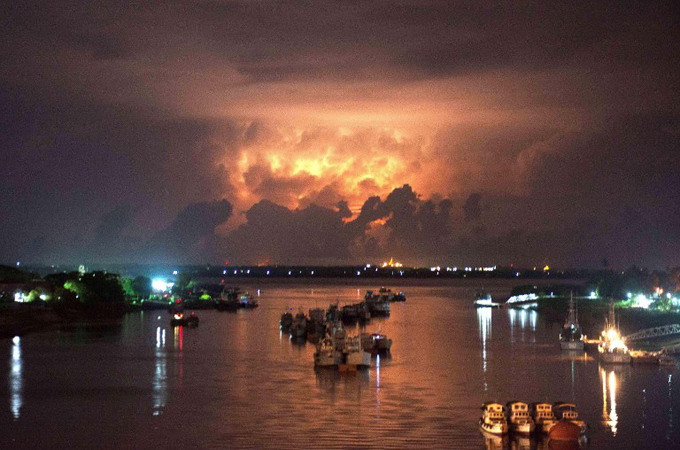At least one person has died and four others were injured, state television said.
Authorities imposed a curfew late on Tuesday in Lashio, about 700km northeast of Yangon, after a mob of 200 local residents surrounded a local police station demanding they hand over a Muslim detainee.
Nay Win, 48, a Muslim from a nearby township, was arrested after allegedly setting fire to Aye Aye Win, 24, a Shan Buddhist, earlier in the day after the two had an altercation at a petrol station, Lashio police said.
The woman was admitted to hospital.
"According to witnesses, she was not burned seriously but has injuries on her face and arms," Sai Sam Min, a member of parliament from Lashio, said.
"According to witnesses, she was not burned seriously but has injuries on her face and arms," Sai Sam Min, a member of parliament from Lashio, said.
|
|
| Jim Della-Giacoma, of the International Crisis Group, talks about the latest violence in Myanmar |
He said he had received reports that some officials in Lashio, including the fire department, "did very little" to stop the Buddhist mob from attacking Muslim establishments.
Myanmar's recent sectarian violence has been partly blamed on the 969 movement, launched in February by an extremist monk in Mandalay named Wirathu, who encourages Buddhists to shun Muslim-owned shops.
There are less than 2,000 Myanmar Muslims living in Lashio, sources said, of the city's estimated population of about 130,000.
Third outbreak
The incident in Shan state is the third outbreak of anti-Muslim violence to flare up in Myanmar this year.
On April 30, in Oakkan, about 100km north of Yangon, Buddhists went on a rampage after a Muslim woman allegedly bumped into a monk, breaking his begging bowl.
 |
| Curfew declared in town in Shan state following the attack. |
In March at least 44 people were killed in sectarian strife in in Meiktila, 450km north of Yangon, where at least 8,000 people, most of them Muslims, were left homeless in riots prompted by an apparent row at a Muslim-owned gold shop.
Deadly unrest last year, mainly targeted at Rohingya Muslims in the western Rakhine state, left about 200 people dead and tens of thousands displaced.
Jim Della-Giacoma of the International Crisis Group says Myanmar needs to address the issue of sectarian violence before it gets worse.
"I think we are seeing a very weak law-enforcement and some poor nation-building," he told Al Jazeera from Jakarta, Indonesia.
"Anybody conducting violence should be punished.
"If you cannot keep these communities, be they Muslim, Christian, Hindu or Buddhist living together, then the future of the country is being challenged here".
Della-Giacoma said the violence could have the potential of spreading to Yangon if the sectarian issue was not resolved.






